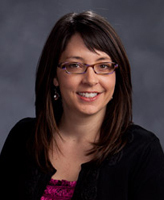
Kasey Buckles, an assistant professor in Notre Dame’s Department of Economics, challenges undergraduates to take the theories, statistics, and modeling tools they learn in their core courses and apply them to universal life experiences like birth, marriage, divorce, and other family dynamics.
In her research-focused seminar called Economics of the Family, Buckles and her students explore questions such as “What is the effect of birth order on prenatal investment in children?” and “How does a mother’s age at first birth affect the academic achievement of her children?”
“We start by talking about marriage, household formation, and divorce,” Buckles says. “We then talk about fertility and family structure. Finally, we talk about families and work, and the effects of different public policies on the family.”
With each topic, Buckles presents the economic theory and assigns an academic paper that investigates the issue empirically. Students are asked to think critically about the theory and methods, with student-led discussions forming a key component of the class. The main assignment for the course is an independent research project in which students use data to address an original research question.
“Ultimately, I hope the students come to appreciate that economics gives them a powerful framework for answering important questions about the world—even in areas like the family where the application might not have been obvious before the class,” Buckles says.
“I also hope they leave with the skills to be thoughtful consumers of academic research—and I am always thrilled when students get the research ‘bug’ and start producing some of that research themselves.”
Student Engagement
The idea for this particular class came from Buckles’ research into family structure, which includes studying whether the spacing between siblings affects their outcomes, how marriage might improve infant health, and whether government subsidies promote the adoption of foster children.
It also sprang from the enthusiasm of students who heard about her research.
“In the past, any time I talked about this work with undergraduates, I got a lot of interest,” she says. “I think the theme of the family appeals to our students because it is related to the University’s unique mission.
“The response to the course has been fantastic. The students in the first class were so engaged and did some exceptional work on their independent research projects.”
After taking the class, for example, senior Phil Anderson decided to write a thesis, which Buckles is advising, on the effects of student loans on fertility.
“Economics of the Family was a very fulfilling class that substantially increased my understanding of who I am as a person, student, and family member, while greatly expanded my working knowledge of applied econometrics,” he says.
“Learning the subject from Professor Buckles was exciting, as she is very much an expert in the field and more than willing to discuss her past and present research endeavors.”
Life Experience
Buckles says her research was initially driven by her own experiences and those of friends and colleagues. She began by looking at questions of work-family balance for high-skilled women, and one of her first studies focused on how the timing of a woman’s first birth affected career outcomes.
“But I came to be interested more generally in how people make these basic but very important decisions,” she says. “Should I get married and when? Should I have children? How many and when? What will be the effects of those decisions on my life and on the lives of my children?”
In support of this scholarship, Buckles has received funding from the National Science Foundation and the National Institutes of Health; her work has also been published in the Journal of Human Resources and the American Economic Review. She serves on the faculty of the Center for Families and Children, Gender Studies Program, and Poverty Studies Interdisciplinary Minor.
Buckles has also recently involved Elizabeth Munnich, a graduate student in the Department of Economics, in her work on sibling spacing and outcomes.
“In our previous study, we considered the effects on test scores,” Buckles says. “But parents certainly care about many other things, including behaviors, success later in life, and family dynamics. Right now we are looking at the effects of spacing on risky behaviors in adolescence.”
Most recently, Buckles began work with the newly formed Lab for Economic Opportunities (LEO), a partnership between Notre Dame and Catholic Charities that joins scholars nationwide with service providers to evaluate poverty-reduction programs. One of Buckles’ research projects with LEO will look at the effects of a high-quality early childhood development program on at-risk children and their families.
Learn More >
- Department of Economics
- Kasey Buckles faculty page
- Lab for Economic Opportunities
- Related story: Want Smarter Children? Space Siblings at Least Two Years Apart, Says Economist Kasey Buckles
- Related story: Study: Subsidies Change Incentives for Adoption of Foster Children
- Related story: New Study Suggests Winter Babies Face Socioeconomic Disadvantages
- Related story: New Study Examines How Cost Affects Decisions to Marry


